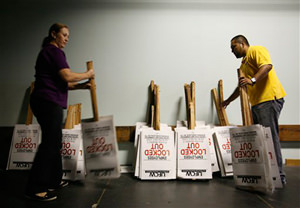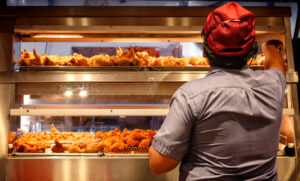Grocery Workers Struggle Despite L.A. Union Victory
A new union contract has been hailed as a "win-win," but a closer look at the agreement shows that it fails to provide decent wages and benefits for most grocery workers.The pact has been hailed as a "win-win" but doesn't provide decent wages and benefits for most workers.
Southern California grocery workers averted a strike in September after coming to an eleventh-hour settlement with the area’s three big grocery chains. Both union officials and company executives are celebrating, but the new contract leaves workers struggling to pay their bills.
The plan was ratified Sept. 19 after grocery workers from seven locals with the United Food and Commercial Workers union voted in support of the deal.
The employees have worked without a contract since March 6.
The UFCW union, representing 62,000 grocery workers, said it is pleased with the negotiations, which were nearly derailed over health care costs.
“It’s a struggle but we made it without having to resort to economic action,” said Michael Straeter, president of UFCW Local 1442 in Santa Monica.
The grocery companies also approved the plan. “We are pleased to reach an agreement that will continue to provide our associates the best total compensation package in our industry in Southern California,” Ralphs President Donna Giordano said in a written statement.
The contentious labor talks were punctuated by massive rallies attended by hundreds of supporters in cities throughout Greater Los Angeles.
At the same time, union and community members aggressively lobbied customers and store managers through an “adopt-a-store” program, the Los Angeles County Federation of Labor pledged $100,000 in strike funds and, to speed up the negotiations, workers took two strike authorization votes, with 90 percent voting in favor of a work stoppage in the last poll.
On Sept. 15, UFCW officials gave a 72-hour notice to strike, warning that they would cancel a labor contract extension with the grocery companies unless a deal was made.
But both sides kept the talks alive, partly over fears of a repeat of the 2003-2004 grocery strikes and lockouts, which lasted more than five months and cost the stores an estimated $2 billion in losses.
By the following Monday, they hammered out a deal that protects pension and health care benefits and provides small increases in wages.
The Southern California contract fight has not only been touted as a victory for grocery employees, but for workers throughout the nation who are struggling to keep affordable health care on the job.
“We’re very glad to have reached an agreement that is good for employees [and] that is good for the companies,” said Ralphs spokeswoman Kendra Doyel.
Although the union and owners of Ralphs, Albertsons and Vons stores are calling the contract a “win-win” situation, a closer look at the agreement shows that it fails to provide decent wages and benefits for most grocery workers.
The Contract
The UFCW focused its contract campaign on keeping health care affordable, in response to the supermarket chains’ efforts to raise out-of-pocket expenses for it.
The increased health care costs would go toward filling the $450 million gap in employer contributions.
The workers’ health care plan has not been adequately funded for years, due to decreases in employer contributions in the 2003 and 2007 contract negotiations. This, despite the fact that the three grocery chains announced $4.5 billion in annual profits.
In the plan, the grocery companies agreed to a $130 million increase in employer contributions, totaling $350 million over the next three years, according to Ralphs executives.
This move enables the grocery workers to maintain current health care premiums at $7 for individual employees and $15 for families.
In exchange, all workers must pay into their health care. In the previous contract, employees who were hired before 2004 were exempt from paying toward their health plan.
Union officials said they did everything they could to avert a strike. “We’re not looking to strike,” Mickey Kasparian, president of United Food and Commercial Workers Local 235 in San Diego, said in a Labor Notes article. “We just didn’t want to go backwards.”
The new contract covers 62,000 grocery workers from Santa Maria, 150 miles north of Los Angeles, to San Diego, bordering Mexico. They include employees of Ralphs, which is owned by Kroger Co.; Vons and Pavilions, owned by Safeway Inc.; and Albertsons, which is owned by SuperValu Inc.
In addition to small changes in their current health care plan, workers will maintain their pension benefits. They will see modest increases in wages as well. This is an improvement from the grocery companies’ plan to slash employees’ pay by up to 50 percent to fund their health care.
Workers will receive pay hikes and bonuses from 15 cents to 25 cents an hour, depending on their wage and job status.
That comes out to $500 a year for most top-tier, full-time meat cutters and clerks, pharmacy techs and food clerks, according to union officials.
Part-time clerks working 30 to 35 hours a week will earn about $450.
“They were very pleased” with the wage increases, said Straeter. “Just the concern that they had that they might have to give up their paychecks and go on strike … was very scary.”
But not everyone agreed with his sentiments.
Tony (not his real name), a cashier at a Ralphs in Studio City whose take-home pay is $1,320 a month, was less than enthusiastic about the wage hikes.
The small increase in pay “could buy me a good lunch,” he quipped. The wage hike isn’t enough to cover rent and other expenses, including health care, he said.Under the health care insurance plan, workers will continue to pay for their own prescription costs, co-pays, deductibles and other outside expenses, which can run up to a maximum of $11,000 per year, according to the union. Grocery companies estimate that figure closer to $8,000.
That amount may prove to be a burden for most workers, whose salaries average between $20,000 and $25,000 a year.
Although some employees would have liked to hold out for a better deal, union officials said that the threat of specialty stores like Trader Joe’s and major chains such as Wal-Mart and Target taking control of the grocery market compelled both sides to sign a deal.
Newspapers throughout the nation have billed the contract a “victory,” because the workers settled on an agreement with the grocery chains, instead of resorting to a strike.
But it was a Pyrrhic victory at best. The workers held on to their jobs, but the same problems of low wages and costly health care persist.
The Next Negotiations
How can the union help ensure a better contract the next time around?
For starters, the UFCW must take its fights to the national stage.
With supermarkets operating in globalized food markets, it was a mistake to limit the contract fights to the Southland. The UFCW should have tried to link up with Northern California grocery workers, whose contracts were due to expire in October. Ideally, the grocery campaign would spread to other states from there.
And while the Los Angeles County Federation of Labor did lend a helping hand to the UFCW by providing strike funds for workers and participating in events, more visible backing from the County Fed’s 800,000 union members would have galvanized widespread and sustained support for grocery employees.
But most important, the grocery employees should have never allowed the union to settle on a contract that maintains low wages and benefits, just for the sake of avoiding a work stoppage.
In the end, only militant, unified and worker-led strikes — and not halfhearted negotiations between union officials and supermarket chain executives — will lead to real change in the workplace for grocery employees.
“They need to go out to the rest of the labor movement and do whatever is needed to actually win. And that’s probably going to mean an industrywide strike,” said Muffy Sunde, a longtime community activist and member of the Communications Workers of America union. “That would set a new tone and that’s something the workers in this country would really appreciate.”
Your support matters…Independent journalism is under threat and overshadowed by heavily funded mainstream media.
You can help level the playing field. Become a member.
Your tax-deductible contribution keeps us digging beneath the headlines to give you thought-provoking, investigative reporting and analysis that unearths what's really happening- without compromise.
Give today to support our courageous, independent journalists.






You need to be a supporter to comment.
There are currently no responses to this article.
Be the first to respond.